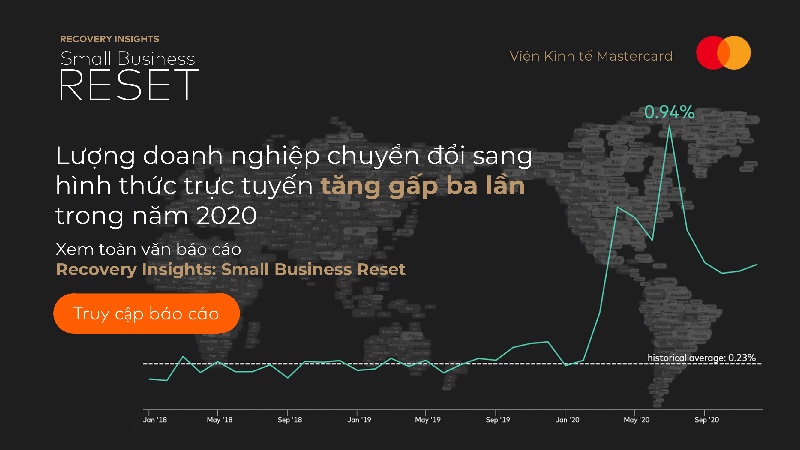New small business formation up 35 per cent on-year in Asia-Pacific region
Looking at 19 markets around the world, including Australia, Hong Kong, Japan, Malaysia, New Zealand, Philippines, Singapore, and Thailand, the report reveals that sales at small- and medium-sized businesses (SMBs) lagged larger companies by up to 20 percentage points at the peak of the crisis. However, 2021 indicated an upward trend. Total sales at SMBs rose 4.5 per cent through August 2021 year-to-date compared to the same period in 2020, and e-commerce sales grew 31.4 per cent globally.
“While businesses of all size were adversely impacted by the pandemic, reliance on local SMB support and lack of digital infrastructure saw SMBs in the Asia-Pacific experiencing far greater hardships at the outset,” said David Mann, chief economist, AP and MEA, Mastercard Economics Institute (MEI). “Against a backdrop of mobility restrictions and zero COVID-19 strategies, e-commerce was a lifeline for organisations to ride out the pandemic. However, the accelerated shift to digital has paved the way for the next generation of entrepreneurs, and we’ve seen a surge in newcomers seizing an opening amidst the disruption.”
 |
| Mastercard Economics Institute: New Small Business Formation in APAC Grew 35 per cent Year-Over-Year |
Drawing on the MEI’s new Small Business Performance Index of aggregated and anonymised sales activity within the Mastercard network, Recovery Insights: Small Business Reset identifies several key trends:
• Closures: In the Asia-Pacific, small businesses that closed early in the pandemic were about twice as likely as larger businesses to remain closed long term, demonstrating greater resilience than elsewhere in the world. Globally, small retailers were on average three times as likely to remain closed after six months, vs. large retailers, with one-third of small businesses that closed in April 2020 remaining closed after six months, and about one-fifth still closed after 12 months.
• E-commerce: Following lockdowns, the number of businesses going online each month tripled from pre-pandemic levels, peaking in July 2020, reflecting increased demand for online sales channels. The shift to digital has persisted at an elevated level since. In Australia, 60 per cent more merchants accepted e-commerce sales in 2020 for the first time vs. 2019.
• Entrepreneurship: Roughly 35 per cent more small retailers in the Asia-Pacific established operations in 2020 than in 2019, a slight increase on the global average of 32 per cent new SMBs formed, and over eight times the 4 per cent of large firms created. This trend is most strongly reflected in Australia (+ 73 per cent), Japan (+38 per cent), and Thailand (+29 per cent).
• Location: As tourists and workers stay closer to home, small businesses in commercial districts are seeing sales suffer, while sales within more residential neighbourhoods grow. Singapore has surpassed pre-pandemic spending outside of the business district, with both SMBs and large businesses seeing spending at 107 per cent and 104 per cent of 2019 levels respectively. In Sydney, retail spending is down roughly 14 per cent in the business district, but up 24 per cent in the outer city.
• Sectors - Restaurants and lodging: In the Asia-Pacific, small lodging businesses outperformed large by a wide margin through 2020 and 2021. Where people are travelling, the trend to stay local has benefited small lodging companies (and hurt big cities’ big hotels). Restaurants were a different story, with SMB eateries underperforming large ones globally by roughly 17 percentage points in 2021 year-to-date. A notable exception is in Hong Kong, whose SMB eating places have seen increased outperformance over large businesses in 2021.
 |
 |
Supporting small business owners is a continued priority for Mastercard, which pledged to bring 50 million small businesses and 25 million women entrepreneurs into the digital economy by 2025. Mastercard’s Digital Doors curriculum helps businesses get online and stay protected, ensuring they have the right tools to maximise their digital presence and integrate e-commerce seamlessly, including the free Small Business Digital Readiness Diagnostic. Most recently, Mastercard committed $25 million to help more than five million micro and SMBs digitise through the Strive initiative.
Mastercard also works closely with governments, businesses, and other organisations around the world to create environments, programmes, and policies so small businesses can flourish. Mastercard provides high-frequency, local spending insights to dozens of city, state, and federal governments as part of our City Possible and Recovery Insights programmes, as well as content such as the recent policy paper addressing ways governments can support SMB recovery.
What the stars mean:
★ Poor ★ ★ Promising ★★★ Good ★★★★ Very good ★★★★★ Exceptional
Related Contents
Latest News
More News
- Temporary relief for food imports as businesses urge overhaul of regulations (February 07, 2026 | 09:00)
- Opella and Long Chau join forces to enhance digestive and bone health (February 06, 2026 | 18:00)
- Vietnam-South Africa strategic partnership boosts business links (February 06, 2026 | 13:28)
- Sun PhuQuoc Airways secures AJW Group support for fleet operations (February 06, 2026 | 13:23)
- Pegasus Tech Ventures steps up Vietnam focus (February 05, 2026 | 17:25)
- The generics industry: unlocking new growth drivers (February 04, 2026 | 17:39)
- Vietnam ready to increase purchases of US goods (February 04, 2026 | 15:55)
- Steel industry faces challenges in 2026 (February 03, 2026 | 17:20)
- State corporations poised to drive 2026 growth (February 03, 2026 | 13:58)
- Why high-tech talent will define Vietnam’s growth (February 02, 2026 | 10:47)

 Tag:
Tag:




















 Mobile Version
Mobile Version